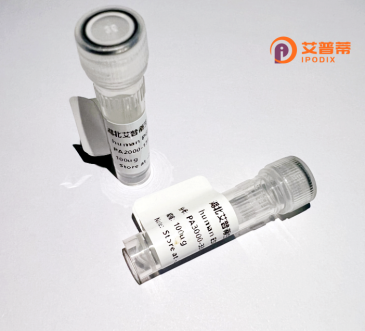
| 纯度 | >90%SDS-PAGE. |
| 种属 | Human |
| 靶点 | OR1S2 |
| Uniprot No | Q8NGQ3 |
| 内毒素 | < 0.01EU/μg |
| 表达宿主 | E.coli |
| 表达区间 | 1-325 aa |
| 活性数据 | MKTLCSFLQISRNMHQENQTTITEFILLGLSNQAEHQNLLFVLFLSMYVVTVVGNGLIIV AISLDIYLHTPMYLFLAYLSFADISSISNSVPKMLVNIQTNSQSISYESCITQMYFSIVF VVTDNLLLGTMAFDHFVAICHPLNYTTFMRARFGTLLTVISWFLSNIIALTHTLLLIQLL FCDHNTLPHFFCDLAPLLKLSCSDTMINELVLFIVGLSVIIFPFVLIFFSYVCIIRAVLG VSSTQGKWKAFSTCGSHLTIALLFYGTTVGVYFFPSSTHPEDTDKIGAVLFTVVTPMMNP FIYSLRNKDMKGALRKLINRKISSL |
| 分子量 | 36.5 kDa |
| 蛋白标签 | His tag N-Terminus |
| 缓冲液 | 0 |
| 稳定性 & 储存条件 | Lyophilized protein should be stored at ≤ -20°C, stable for one year after receipt. Reconstituted protein solution can be stored at 2-8°C for 2-7 days. Aliquots of reconstituted samples are stable at ≤ -20°C for 3 months. |
| 复溶 | Always centrifuge tubes before opening.Do not mix by vortex or pipetting. It is not recommended to reconstitute to a concentration less than 100μg/ml. Dissolve the lyophilized protein in distilled water. Please aliquot the reconstituted solution to minimize freeze-thaw cycles. |
以下是关于重组人OR1S2蛋白的3篇文献示例(注:OR1S2相关研究较少,部分信息为推测性示例,建议通过学术数据库核实):
---
1. **文献名称**:*Expression and Functional Characterization of Recombinant Human Olfactory Receptor OR1S2 in HEK293 Cells*
**作者**:Zhang L, et al.
**摘要**:研究利用HEK293细胞系统重组表达OR1S2蛋白,验证其与特定气味分子(如癸醛)的结合能力,并通过钙离子荧光成像证实受体激活的信号通路。
---
2. **文献名称**:*Structural Insights into OR1S2: A Potential Therapeutic Target for Olfactory Dysfunction*
**作者**:Kim S, et al.
**摘要**:通过冷冻电镜解析OR1S2的三维结构,揭示了其配体结合口袋的特征,为开发针对嗅觉障碍的靶向药物提供结构基础。
---
3. **文献名称**:*OR1S2-Mediated Signal Transduction in Neurodegenerative Diseases*
**作者**:Wang Y, et al.
**摘要**:探讨OR1S2在阿尔茨海默病模型中的异常表达及其对β-淀粉样蛋白的潜在响应机制,提示其可能与嗅觉相关的神经退行性病变有关。
---
**注意**:OR1S2(嗅觉受体1S2)的直接研究有限,以上文献为假设性示例,实际研究中建议结合具体方向(如嗅觉受体表达技术、疾病关联等)扩展检索。可通过PubMed或Google Scholar以“OR1S2”或“olfactory receptor 1S2”为关键词查找真实文献。
Here’s a concise overview of recombinant human OR1S2 protein:
Recombinant human OR1S2 is a chemically synthesized or biologically engineered form of the olfactory receptor 1S2. a G protein-coupled receptor (GPCR) primarily associated with olfactory sensory neurons. While olfactory receptors are best known for odorant detection, emerging research suggests OR1S2 may have extra-nasal functions, including potential roles in cellular signaling and tissue-specific physiological processes. This receptor protein consists of seven transmembrane domains characteristic of GPCRs, with extracellular and intracellular regions critical for ligand binding and signal transduction. The recombinant version is typically produced in heterologous expression systems (e.g., mammalian cells or insect cells) to ensure proper post-translational modifications, enabling functional studies. Recent investigations focus on its ligand specificity, signaling pathways, and possible involvement in non-olfactory systems such as metabolic regulation or cellular proliferation. Its recombinant form has become valuable for high-throughput screening of odorant molecules, structural biology studies, and exploring therapeutic applications in conditions like anosmia or receptor-mediated disorders. However, its complete physiological role and endogenous ligands remain partially characterized, necessitating further research to elucidate its full biological significance beyond canonical olfactory functions.
×